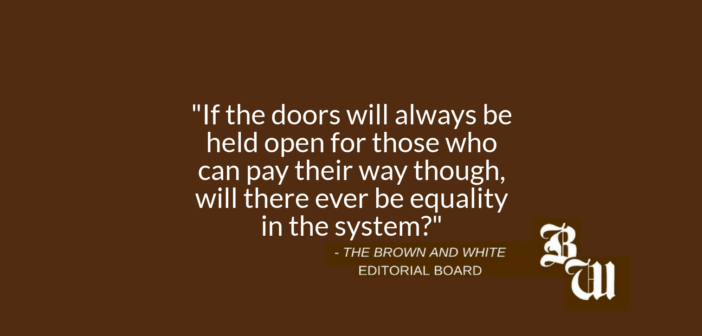The mindset that higher education is widely unattainable is not a new phenomenon.
A history of affirmative action and schools facing “tracking,” which has been equated to modern day segregation, serve as evidence that the education system continues to favor the white and the wealthy.
College tuition, which has continued to rise, left the 69 percent of 2018 graduates who took out student loans in an average of almost $30,000 of debt. Simultaneously, income disparity and the wage gap have remained astonishingly stagnant. The mindset is only gaining validity.
With high debts like this, it seems college is not a worthwhile investment for the average American.
That is why the news of the recent Operation Varsity Blues scandal, where parents allegedly bribed coaches and administrators to get their children accepted to colleges, has not resulted in shock, but outrage. Those who have already been heavily disheartened by the nature of higher education have grown to expect this behavior from school administrators and the system as a whole.
The FBI investigation revealed that upward of 50 individuals, some as notable as actresses Felicity Huffman and Lori Loughlin, were involved in a string of fraudulent scandals, paying collective millions to ensure falsified standardized test scores and college acceptances for their children.
“Parents paid a California man named William Rick Singer a predetermined amount to his fake charity,” according to a Sports Illustrated piece explaining the case. “Those funds would then be used to bribe either an SAT or ACT administrator to cheat on the exams, or a college athletic coach or official to designate non-athletes as recruits.”
Not only does this scandal continue to widen the gap of whom higher education is attainable for, but it goes further to affirm that those with financial power will continue to have the upper hand, despite schools’ proclaimed efforts to diversify.
We like to believe that those who work hard can attain anything, but it is becoming increasingly accepted that a college education serves more as an indebting obstacle in the road to the workforce than the lucrative necessity it was once viewed as.
We may also call into question the role of admissions and university administration in times like this. It is not news that children of legacies and generous donors have heightened chances of admission, but the blatant ability of an administration to be bought altogether justifiably leads to a lack of faith in the system.
Even here at Lehigh students are forced to wonder, is there a price at which admissions opens its doors automatically?
It is hard to determine what the line is between generous donation and blatant bribery. Universities have relied on donations since their origin, and institutions are not at fault for accepting them in order to continue to grow.
While the practice of rewarding generosity may be viewed as corrupt, universities, especially private institutions like Lehigh, are corporations that require the money from donors to best serve their students and staff.
Operation Varsity Blues has left students and families alike questioning where else this is happening.
If the doors will always be held open for those who can pay their way through, will there ever be equality in the system?
Arguably the inequality stems far before bribery or donation. Students who come from more affluent backgrounds are given opportunities such as private standardized test tutors and private college counselors who are paid to ensure the process is as seamless as possible. While these students may not be committing fraud, it is important to acknowledge that this alone creates a disparity in the system.
We are forced to wonder what this means for an already unstable future of higher education. It is undeniable that not just the institutions or the students, but higher education as a whole took a hit amidst this scandal. The system is continuously loosing validity and those who fall victim to its inequalities will continue to lose faith, leaving the gaping systemic inequalities to widen even further.






Comment policy
Comments posted to The Brown and White website are reviewed by a moderator before being approved. Incendiary speech or harassing language, including comments targeted at individuals, may be deemed unacceptable and not published. Spam and other soliciting will also be declined.
The Brown and White also reserves the right to not publish entirely anonymous comments.
2 Comments
I love how the Brown and White is now shaming students who used private tutors to better their SAT scores.
Do you want to make a real difference? Put pressure on the administration to lower tuition costs by cutting spending. Look around I am sure there are plenty of people at Lehigh that your tuition dollars unnecessarily employ. This is the only way you can actually level the playing field. You might want to do a little research into the University’s form 990 which is a public document (www.guidestar.org) outlying their finances and then you can write an actual informative article.
Losing, not loosing. Wasted money on those SAT tutors.
So, big talkers: what are you going to do about it when you’re done with your quarter-million-dollarino educations? (I will note that $250K pays full freight for 2.5 students at my university. Tuition, housing, everything. Many of the students are paying their own way, because their parents have no money. Indeed some are helping to support their parents while going to school. It’s why we also have food pantries on campus.)
Are you going to hire preferentially from state universities, once you’re in a position to hire?
Are you going to live in a place where you’re willing to send your children to public school, and fight for the quality of education in all the schools in the district, not just your kids’ schools?
Are you going to avoid the mistakes of plutes who think they’re doing a nice thing, like the College Board guy’s offer to help get poor kids into Ivies, without thinking about any of the social realities that lead to almost no uptake on the offer?
Are you going to talk about poor people in the abstract without knowing any?
Are you going to help fund public libraries, public schools, public transit, public recreation, public health, public housing — all things necessary for the educational success of poor kids?
Are you going to fight for higher taxes for yourself and your family?
Are you going to vote for income-inequality-reducing measures that would make it hard for you to get a fat raise?
Whatchoo gon’ do, people?